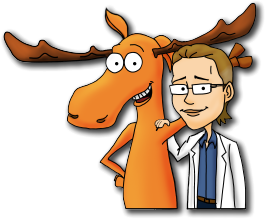Any new break throughs for the treatment of anxiety and depression are VERY exciting for the medical world.
One of these recent break throughs in medicine is the connection between a healthy, functioning gut and our mental and emotional well being.
This post will look at the research surrounding the idea that probiotics and gut health may have a significant impact for the treatment of depression and anxiety.
Depression and Anxiety Disorders
Depression and anxiety disorders are major issues for millions of people worldwide.
Indeed, according to the World Health Organization (WHO) depression affects the lives of over 300 million people worldwide.
Likewise, large population surveys1 show that up to 33.7% of the population suffer from one of the anxiety disorders at some point in their lifetime. That is around a third of the total population.
Often, the symptoms of anxiety and depression overlap. That is anxiety sufferers may experience depressive symptoms and depression is often accompanied by anxiety.
The Mind-Body Connection
Western cultures tend to maintain a more distinct separation between the mind and body.
Well, Eastern cultures traditionally more fully embrace the idea of a mind-body connection. Indeed, physicians in the West treat illness or ‘dis’ease in the body3 rather than concentrating on maintaining a healthy balance between body and mind.
What exactly does a mind-body connection mean? Well, it is a two way relationship between our thoughts, beliefs and emotions and the body’s biological function and vice-versa.
So, basically, a person’s mind has a direct effect on the health of the body. Likewise, the health of the body, including diet and exercise, directly impacts the mind and emotions.
What exactly is the gut-brain Axis?
So, even though the connection between the gut and emotions has been known on a subconscious level for decades, medical research is only just catching up.
The Biology of the Gut-Brain Axis
For many decades medical researchers thought that the microorganisms in the gut are mainly beneficial for keeping the ‘bad’ bacteria at manageable levels4.
It is well known that the gut flora also helps to digest and metabolise foods.
Furthermore, the gut microbiota plays an important role in the immune system too.
The composition of the gut microbiota also plays a part in the inflammatory response.
The very latest research is starting to show that an imbalance in gut microbiota may play a part in many chronic illnesses. 5,6,7
What are Probiotics and Prebiotics?
Basically, probiotics are the ‘good’ live bacteria, yeast and microorganisms in your gut that are beneficial to well-being and health.
So, probiotics are found in abundance in certain foods, especially fermented foods. Examples of foods rich in probiotics are:-
- Live yoghurt
- Sauerkraut
- Kimchi
- Miso
- Kefir
Also, important to the whole gut health are the foods that feed the probiotics, and these are known as ‘prebiotics’ and include:-
- garlic
- bananas
- onion
- leeks
- chives
- avocado
- peas
- soybeans
Probiotics for Anxiety
However, this post is all about the role of gut flora and anxiety symptoms, so let’s not digress.
The recent research shows that the gut microbiota is very important to both brain development and healthy brain function.
Indeed a recent 2016 research study8 shows that,
… diet and gut health affects symptoms of stress related disorders, depression, and anxiety through changes in the gut microbiota
Initial studies on some mental illnesses including :-
- Anxiety
- Depression
- Schizophrenia
- Autism spectrum disorder
found that subjects often presented with a marked gut dysfunction at the same time as the mental health disorder.
Furthermore, recent research suggests that improving the gut health with probiotics in turn improves the symptoms of depression, especially anxiety disorders9,10,11.
Research on Probiotics for Anxiety and Depression
There is a whole body of scientific research studies now on the effects of probiotics for help with anxiety and depression.
Interestingly, an imbalance in gut microbes may be linked with causing depression and anxiety. However, emotional trauma or stress, in turn, causes an imbalance in the gut microbiota. The brain-gut axis really is a two-way interactive mechanism. This is known as a ‘bidirectional’ process.
One large 2017 meta-analysis examined probiotics for anxiety. This recent study examimes ten pieces of research on probiotics and anxiety.
The study concludes that probiotics do decrease anxiety symptoms, both in healthy individuals and those suffering with anxiety disorders. Furthermore, fermented foods and probiotics have had some impressive effects15 on the symptoms of social anxiety disorder (SAD).
However, the study stresses that in the future more rigourous trials are necessary to determine :-
- which specific probiotics are the most effective
- what dosage of probiotics is optimal
- the length of treatment with probiotics for maximal effectiveness
Conclusions
Whilst the above findings of probiotics for anxiety and depression are exciting we do need to exercise some caution.
Headlines, such as ‘Probiotics are the New Prozac‘ are misleading and possibly jumping the gun a little.
It has been well known for many years, that exercise and diet have a beneficial effect on symptoms of both depression and anxiety.
So, whilst probiotics may well help ease symptoms do not give up proper medical supervision and treatment with your physician.
If you suffer mild anxiety, that does not require medical treatment, then adding some fermented foods to your diet, or taking a probiotic supplement, may well help.
However, if you’re anxiety or depression needs medical care, be sure to continue traditional treatments such as:-
- Cognitive behavioral therapy
- Medications: Selective serotonin reuptake inhibitors (SSRIs), Benzodiazepines and anti-depressants
- Psychotherapy
- Exercise
- Relaxation Techniques: meditation, yoga, etc.
Always discuss supplemental treatments, such as probiotics, with your physician. Any specialist should be up-to-date with all the latest research and able to advise you.
However, initial studies show VERY few to no side effects associated with taking probiotics.
An all-round healthy diet (including probiotics) and exercise plan will undoubtedly help with anxiety.
Most Recent Posts
- The Anxiety Diet: Top Foods to Eat to STOP Anxiety
- Natural Remedies for Anxiety
- The Fertility Diet: Natural Ways to Conception
- Food Addiction: Is this Possible?
- Hashimoto Diet: Foods to Avoid and Why?
- Natural Weight Loss: 4 Easy Steps
- Raw Vegan Diet: The Facts and the Fiction
- 16:8 Fasting Plan – Guaranteed Weight Loss
Further Reading
- Full Index of ALL of our Anxiety Posts
- Index of Diet for Disease Posts
- Weight Loss Posts
- Diet for Diseases Articles
- Index of our Articles on Diets


